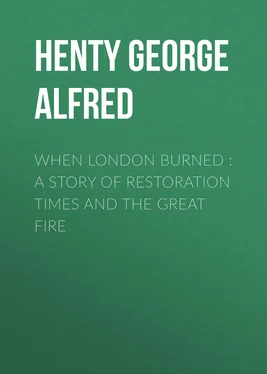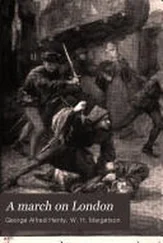George Henty - When London Burned - a Story of Restoration Times and the Great Fire
Здесь есть возможность читать онлайн «George Henty - When London Burned - a Story of Restoration Times and the Great Fire» — ознакомительный отрывок электронной книги совершенно бесплатно, а после прочтения отрывка купить полную версию. В некоторых случаях можно слушать аудио, скачать через торрент в формате fb2 и присутствует краткое содержание. Жанр: foreign_children, foreign_antique, foreign_prose, на английском языке. Описание произведения, (предисловие) а так же отзывы посетителей доступны на портале библиотеки ЛибКат.
- Название:When London Burned : a Story of Restoration Times and the Great Fire
- Автор:
- Жанр:
- Год:неизвестен
- ISBN:нет данных
- Рейтинг книги:5 / 5. Голосов: 1
-
Избранное:Добавить в избранное
- Отзывы:
-
Ваша оценка:
- 100
- 1
- 2
- 3
- 4
- 5
When London Burned : a Story of Restoration Times and the Great Fire: краткое содержание, описание и аннотация
Предлагаем к чтению аннотацию, описание, краткое содержание или предисловие (зависит от того, что написал сам автор книги «When London Burned : a Story of Restoration Times and the Great Fire»). Если вы не нашли необходимую информацию о книге — напишите в комментариях, мы постараемся отыскать её.
When London Burned : a Story of Restoration Times and the Great Fire — читать онлайн ознакомительный отрывок
Ниже представлен текст книги, разбитый по страницам. Система сохранения места последней прочитанной страницы, позволяет с удобством читать онлайн бесплатно книгу «When London Burned : a Story of Restoration Times and the Great Fire», без необходимости каждый раз заново искать на чём Вы остановились. Поставьте закладку, и сможете в любой момент перейти на страницу, на которой закончили чтение.
Интервал:
Закладка:
Cyril, on arriving in London, was heartily welcomed by his father, who had, for the moment, high hopes of recovering his estates. These, however, soon faded, and although Sir Aubrey would not allow it, even to himself, no chance remained of those Royalists, who had, like him, parted with their estates for trifling sums, to be spent in the King's service, ever regaining possession of them.
It was not long before Cyril perceived that unless he himself obtained work of some sort they would soon be face to face with actual starvation. He said nothing to his father, but started out one morning on a round of visits among the smaller class of shopkeepers, offering to make up their books and write out their bills and accounts for a small remuneration. As he had a frank and pleasant face, and his foreign bringing up had given him an ease and politeness of manner rare among English lads of the day, it was not long before he obtained several clients. To some of the smaller class of traders he went only for an hour or two, once a week, while others required their bills and accounts to be made out daily. The pay was very small, but it sufficed to keep absolute want from the door. When he told his father of the arrangements he had made, Sir Aubrey at first raged and stormed; but he had come, during the last year or two, to recognise the good sense and strong will of his son, and although he never verbally acquiesced in what he considered a degradation, he offered no actual opposition to a plan that at least enabled them to live, and furnished him occasionally with a few groats with which he could visit a tavern.
So things had gone on for more than a year. Cyril was now sixteen, and his punctuality, and the neatness of his work, had been so appreciated by the tradesmen who first employed him, that his time was now fully occupied, and that at rates more remunerative than those he had at first obtained. He kept the state of his resources to himself, and had no difficulty in doing this, as his father never alluded to the subject of his work. Cyril knew that, did he hand over to him all the money he made, it would be wasted in drink or at cards; consequently, he kept the table furnished as modestly as at first, and regularly placed after dinner on the corner of the mantel a few coins, which his father as regularly dropped into his pocket.
A few days before the story opens, Sir Aubrey had, late one evening, been carried upstairs, mortally wounded in a brawl; he only recovered consciousness a few minutes before his death.
"You have been a good lad, Cyril," he said faintly, as he feebly pressed the boy's hand; "far better than I deserve to have had. Don't cry, lad; you will get on better without me, and things are just as well as they are. I hope you will come to your estates some day; you will make a better master than I should ever have done. I hope that in time you will carry out your plan of entering some foreign service; there is no chance here. I don't want you to settle down as a city scrivener. Still, do as you like, lad, and unless your wishes go with mine, think no further of service."
"I would rather be a soldier, father. I only undertook this work because I could see nothing else."
"That is right, my boy, that is right. I know you won't forget that you come of a race of gentlemen."
He spoke but little after that. A few broken words came from his lips that showed that his thoughts had gone back to old times. "Boot and saddle," he murmured. "That is right. Now we are ready for them. Down with the prick-eared knaves! God and King Charles!" These were the last words he spoke.
Cyril had done all that was necessary. He had laid by more than half his earnings for the last eight or nine months. One of his clients, an undertaker, had made all the necessary preparations for the funeral, and in a few hours his father would be borne to his last resting-place. As he stood at the open window he thought sadly over the past, and of his father's wasted life. Had it not been for the war he might have lived and died a country gentleman. It was the war, with its wild excitements, that had ruined him. What was there for him to do in a foreign country, without resource or employment, having no love for reading, but to waste his life as he had done? Had his wife lived it might have been different. Cyril had still a vivid remembrance of his mother, and, though his father had but seldom spoken to him of her, he knew that he had loved her, and that, had she lived, he would never have given way to drink as he had done of late years.
To his father's faults he could not be blind; but they stood for nothing now. He had been his only friend, and of late they had been drawn closer to each other in their loneliness; and although scarce a word of endearment had passed between them, he knew that his father had cared for him more than was apparent in his manner.
A few hours later, Sir Aubrey Shenstone was laid to rest in a little graveyard outside the city walls. Cyril was the only mourner; and when it was over, instead of going back to his lonely room, he turned away and wandered far out through the fields towards Hampstead, and then sat himself down to think what he had best do. Another three or four years must pass before he could try to get service abroad. When the time came he should find Sir John Parton, and beg him to procure for him some letter of introduction to the many British gentlemen serving abroad. He had not seen him since he came to England. His father had met him, but had quarrelled with him upon Sir John declining to interest himself actively to push his claims, and had forbidden Cyril to go near those who had been so kind to him.
The boy had felt it greatly at first, but he came, after a time, to see that it was best so. It seemed to him that he had fallen altogether out of their station in life when the hope of his father's recovering his estates vanished, and although he was sure of a kindly reception from Lady Parton, he shrank from going there in his present position. They had done so much for him already, that the thought that his visit might seem to them a sort of petition for further benefits was intolerable to him.
For the present, the question in his mind was whether he should continue at his present work, which at any rate sufficed to keep him, or should seek other employment. He would greatly have preferred some life of action,—something that would fit him better to bear the fatigues and hardships of war,—but he saw no prospect of obtaining any such position.
"I should be a fool to throw up what I have," he said to himself at last. "I will stick to it anyhow until some opportunity offers; but the sooner I leave it the better. It was bad enough before; it will be worse now. If I had but a friend or two it would not be so hard; but to have no one to speak to, and no one to think about, when work is done, will be lonely indeed."
At any rate, he determined to change his room as soon as possible. It mattered little where he went so that it was a change. He thought over various tradesmen for whom he worked. Some of them might have an attic, he cared not how small, that they might let him have in lieu of paying him for his work. Even if they never spoke to him, it would be better to be in a house where he knew something of those downstairs, than to lodge in one where he was an utter stranger to all. He had gone round to the shops where he worked, on the day after his father's death, to explain that he could not come again until after the funeral, and he resolved that next morning he would ask each in turn whether he could obtain a lodging with them.
The sun was already setting when he rose from the bank on which he had seated himself, and returned to the city. The room did not feel so lonely to him as it would have done had he not been accustomed to spending the evenings alone. He took out his little hoard and counted it. After paying the expenses of the funeral there would still remain sufficient to keep him for three or four months should he fall ill, or, from any cause, lose his work. He had one good suit of clothes that had been bought on his return to England,—when his father thought that they would assuredly be going down almost immediately to take possession of the old Hall,—and the rest were all in fair condition.
Читать дальшеИнтервал:
Закладка:
Похожие книги на «When London Burned : a Story of Restoration Times and the Great Fire»
Представляем Вашему вниманию похожие книги на «When London Burned : a Story of Restoration Times and the Great Fire» списком для выбора. Мы отобрали схожую по названию и смыслу литературу в надежде предоставить читателям больше вариантов отыскать новые, интересные, ещё непрочитанные произведения.
Обсуждение, отзывы о книге «When London Burned : a Story of Restoration Times and the Great Fire» и просто собственные мнения читателей. Оставьте ваши комментарии, напишите, что Вы думаете о произведении, его смысле или главных героях. Укажите что конкретно понравилось, а что нет, и почему Вы так считаете.












